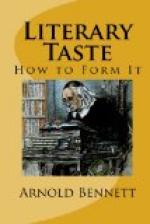Fourth: Open the Bible and read the fortieth chapter of Isaiah. It is the chapter which begins, “Comfort ye, comfort ye, my people,” and ends, “They shall run and not be weary, and they shall walk and not faint.” This chapter will doubtless be more or less familiar to you. It cannot fail (whatever your particular ism) to impress you, to generate in your mind sensations which you recognise to be of a lofty and unusual order, and which you will admit to be pleasurable. You will probably agree that the result of reading this chapter (even if your particular ism is opposed to its authority) is finer than the result of reading a short story in a magazine or even an essay by Charles Lamb. Now the pleasurable sensations induced by the fortieth chapter of Isaiah are among the sensations usually induced by high-class poetry. The writer of it was a very great poet, and what he wrote is a very great poem. Fifth: After having read it, go back to Hazlitt, and see if you can find anything in Hazlitt’s lecture which throws light on the psychology of your own emotions upon reading Isaiah.
Sixth: The next step is into unmistakable verse. It is to read one of Wordsworth’s short narrative poems, The Brothers. There are editions of Wordsworth at a shilling, but I should advise the “Golden Treasury” Wordsworth (2s. 6d. net), because it contains the famous essay by Matthew Arnold, who made the selection. I want you to read this poem aloud. You will probably have to hide yourself somewhere in order to do so, for, of course, you would not, as yet, care to be overheard spouting poetry. Be good enough to forget that The Brothers is poetry. The Brothers is a short story, with a plain, clear plot. Read it as such. Read it simply for the story. It is very important at this critical stage that you should not embarrass your mind with preoccupations as to the form in which Wordsworth has told his story. Wordsworth’s object was to tell a story as well as he could: just that. In reading aloud do not pay any more attention to the metre than you feel naturally inclined to pay. After a few lines the metre will present itself to you. Do not worry as to what kind of metre it is. When you have finished the perusal, examine your sensations....
Your sensations after reading this poem, and perhaps one or two other narrative poems of Wordsworth, such as Michael, will be different from the sensations produced in you by reading an ordinary, or even a very extraordinary, short story in prose. They may not be so sharp, so clear and piquant, but they will probably be, in their mysteriousness and their vagueness, more impressive. I do not say that they will be diverting. I do not go so far as to say that they will strike you as pleasing sensations. (Be it remembered that I am addressing myself to an imaginary tyro in poetry.) I would qualify them as being “disturbing.” Well, to disturb the spirit is one of the greatest aims of art.




